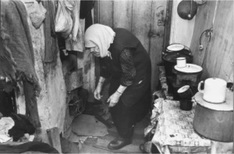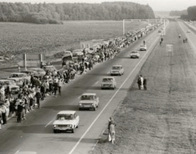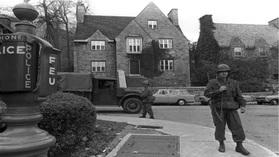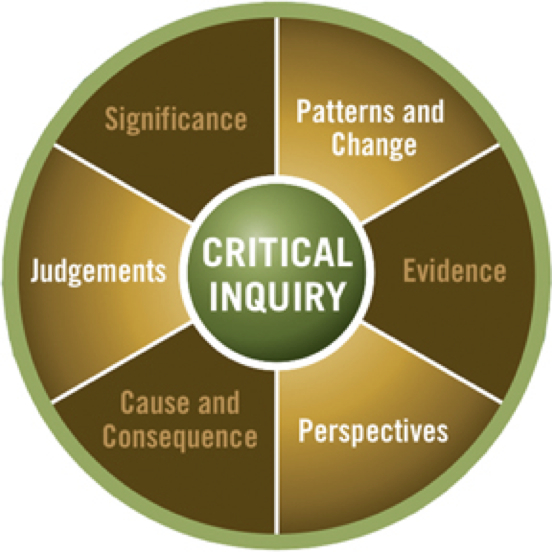The Echo Project
Students making connections between the living past and critical themes in Canadian Identity
The Echo Project is about exploring an aspect of 20th century Canadian history through a generational lens. This is done by making a personal connection to the past through interviews and scouring intimate primary documents such as family journals, letters, and photographs as well as what students find with broader research. Students think critically about sources and patterns, develop historical empathy, and get creative with how they represent the past. While many students choose topics related to the World War II era (our focus in 2015), they may discover they have ties to stories and events before or after the war such as the Great Depression of the 1930s or the Cold War of the 1950s and 60s.
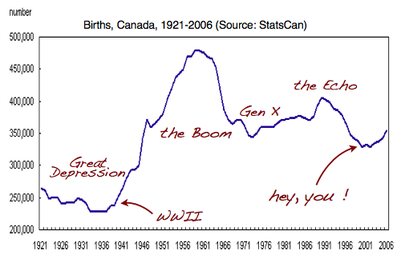
An echo is a great metaphor for the act of learning valuable lessons from the past and carrying them on for your own benefit and the benefit of those that follow. An echo also refers to a demographic cohort, a group of people growing up at the same time. This is your peer group -- you are in fact called the Echo Generation, also known as the Y or Millennial Generation. That’s the group of Canadians born from about 1980-2003. For the most part, your parents are the last of the BABY BOOM generation (1946-1964) and early GEN X (1965-1979). For many of you, this means your grandparents or great-grandparents or other elderly people you may know were born before the end of WWII and have lived through and remember some of the most significant events from 1930-1970, as well as their own ordinary and extraordinary stories. What can you learn from them? Another way to look at this: you are the last group of students that has a living connection to those who served in and endured World War II -- the average Canadian WWII vet was 91 years old in 2015. In addition to vets, there are many Canadians alive today and dwelling in your community that remember the beginning of WWII 76 years ago. If you reach back two generations or shout across a 50+ year gap, what will the echo sound like?
This is a significant project in Social Studies 11 that will occupy your time off and on for about 10 weeks. While we may spend a few classes in the library in order for you to work on this project, much of it will need to take place on your own time -- a fair trade-off considering I don't assign much homework! Your goal is to connect two kinds of research: a topic or set of topics that interests you concerning events in 20th Century Canadian history, and some heritage inquiry where you interview someone with firsthand knowledge of the matching time period. The product of your research may involve a report, a presentation, a poster, a video, or a re-enactment.
To start with, take a survey through some of the topics that might interest you in the mid-20th century. Below are some examples of research topics and historical issues that you might place at the centre of your Echo Project. Many of them were added to the list because they came from past Social Studies 11 students' family stories. While you are encouraged to focus on the World War II era (because the informants who remember this time firsthand will not be with us forever!), you are welcome to go where your hunches take you. Next, start thinking about how you can make a personal connection, usually through an interview or some heritage inquiry. Perhaps you did some of this last year in Socials 10 and have some leads you can now follow.
This is also a chance for cross-curricular learning. Maybe your research and presentation will involve creative writing, artwork, music, food, construction, acting/dramatization, performance, demonstration, or computer programming. For some of you this will be new territory -- how your project unfolds, and what kind of research questions you ask, will be up to you and your own interests and connections to history.
Why take this seriously? Don't take it from me, take it from students who got a lot out of their Echo Projects.
Watch the beginning of this video to see why it is important to learn from previous generations firsthand before it is too late: The Fallen of World War II
This is a significant project in Social Studies 11 that will occupy your time off and on for about 10 weeks. While we may spend a few classes in the library in order for you to work on this project, much of it will need to take place on your own time -- a fair trade-off considering I don't assign much homework! Your goal is to connect two kinds of research: a topic or set of topics that interests you concerning events in 20th Century Canadian history, and some heritage inquiry where you interview someone with firsthand knowledge of the matching time period. The product of your research may involve a report, a presentation, a poster, a video, or a re-enactment.
To start with, take a survey through some of the topics that might interest you in the mid-20th century. Below are some examples of research topics and historical issues that you might place at the centre of your Echo Project. Many of them were added to the list because they came from past Social Studies 11 students' family stories. While you are encouraged to focus on the World War II era (because the informants who remember this time firsthand will not be with us forever!), you are welcome to go where your hunches take you. Next, start thinking about how you can make a personal connection, usually through an interview or some heritage inquiry. Perhaps you did some of this last year in Socials 10 and have some leads you can now follow.
This is also a chance for cross-curricular learning. Maybe your research and presentation will involve creative writing, artwork, music, food, construction, acting/dramatization, performance, demonstration, or computer programming. For some of you this will be new territory -- how your project unfolds, and what kind of research questions you ask, will be up to you and your own interests and connections to history.
Why take this seriously? Don't take it from me, take it from students who got a lot out of their Echo Projects.
Watch the beginning of this video to see why it is important to learn from previous generations firsthand before it is too late: The Fallen of World War II
Example Topics
|
Examples of Interview Questions
Types of Project Submissions
Your analysis of the issue or exploration of the topic could take many forms, including:
Examples of what you might do to build your Echo Project
For TeachersHere's a short pdf document explaining the value of the Echo Project and offering suggestions for delivery and assessment
Here's a sample template with a rubric-based tool for student self-assessment and another one for teacher evaluation of student Echo Projects. |
Process of InquiryWhatever you choose, you should think critically about your subject:
> EVIDENCE -- who was involved, where did it take place or affect, include primary sources > PATTERNS & CHANGE -- relate it to time period and relevant events, relate to place/landscape > CAUSE & EFFECT -- explained through relevant details, show the connection > JUDGEMENTS -- what did Canadians learn from this, how will history view this topic > PERSPECTIVES -- explore multiple viewpoints and compare biases > SIGNIFICANCE -- how is this issue important for Canada, how is it meaningful to you |
Regardless of format, find some way to include your reference list -- the sources you used to conduct research and learn about your topic. You are strongly encouraged to use a firsthand interview or other primary sources to gain perspective or add to your understanding of the issue and the time period... you may have noticed some sample interview questions above. You are also encouraged to use technology meaningfully and only if it supports what you are trying to do. Powerpoints on their own with no person in front of them is a "tired" idea... but there are still powerful uses of technology to consider like video mashups, recording of interview clips, visually displaying data (showing your research), use of Google Earth, etc.
Interview tips: Talk to someone who lived through the Depression, WWII, Coldwar/Postwar era or has experience with the topic or issue you have chosen. Design questions to help you understand:
Interview tips: Talk to someone who lived through the Depression, WWII, Coldwar/Postwar era or has experience with the topic or issue you have chosen. Design questions to help you understand:
- changes in society and how people lived
- impressions of governments and politicians
- understanding of what Canadians found important
- how people adapted to different lands, resources, work and economic conditions
- thoughts about major events taking place of the world
How to Start
As you explore topics, interview sources, and other aspects of your project, you should spiral inwards onto an essential questions. This will help remind you of what's important, and will make the experience memorable (seems weird to say but you'll see what I mean if you take this seriously). Essential questions should:
Good luck... I am thrilled to see the results.
- spark the imagination
- introduce a problem that has a means of being solved
- have depth -- dimension and significance
- push thinking, creativity, and broad inquiry
Good luck... I am thrilled to see the results.
